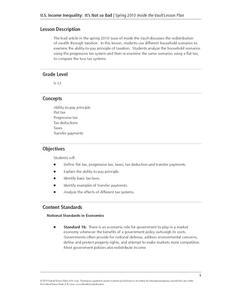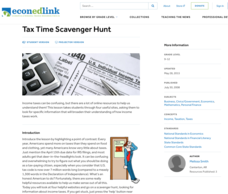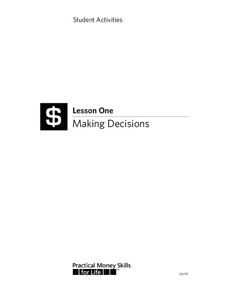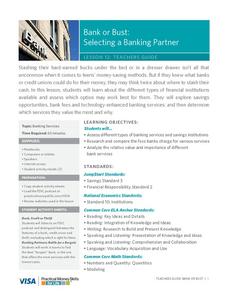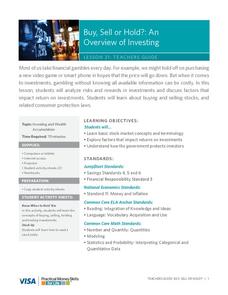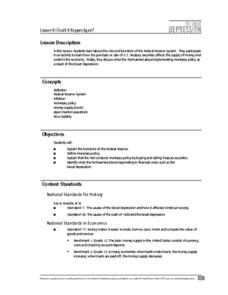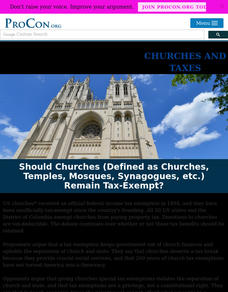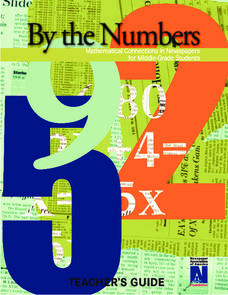Federal Reserve Bank
U.S. Income Inequality: It's Not So Bad
What is the difference between a flat tax, progressive tax, tax deduction and transfer payments? Pupils examine the ability-to-pay principle of taxation through discussion, problem solving, and a variety of worksheets on topics from US...
Federal Reserve Bank
Time Inconsistency: Today’s Actions = Tomorrow’s Regrets
Why do we choose instant gratification over maximizing lifetime satisfaction? How is this reflected in government and macroeconomics? Learn how one research analyst proposes individuals and governments can accomplish greater lifetime...
Council for Economic Education
Tax Time Scavenger Hunt
Is a 1040EZ tax form really easy? Scholars investigate the complexities of the United States taxation system with an economics lesson. Using a wide variety of web sources, they interpret IRS taxation rules and regulations to better...
Visa
Making Decisions
What economic factors can influence personal and financial decisions? In an effort to understand opportunity costs and the time value of money, pupils engage in role-playing activities and discussion, as well as view a PowerPoint...
Visa
Dream Big: Money and Goals
Whether their objective is independent living, going to college, or buying a car, pupils will participate in discussions and complete worksheets to gain an understanding of how short- and long-term goals play a large role in helping...
Council for Economic Education
Balance of Payments (BOP)
Have you ever checked your clothes to see how many nations created them? Pupils take a deeper look at international trade and the balance of payments nations have with one another. They use calculations, simulations, and primary sources...
College Board
2004 AP® Macroeconomics Free-Response Questions Form B
A problem set explores how an international crisis could affect the economic health of Canada using authentic materials from College Board. Other questions ask learners to create and evaluate supply and demand curves and examine factors...
Federal Reserve Bank
Beatrice’s Goat: A Lesson on Savings Goals
Youngsters learn the meaning of saving and how to reach savings goals by first reading a story of a young Ugandan girl who is gifted a goat, and then discovering the opportunity costs of savings decisions made by her and her family.
Federal Reserve Bank
Worth!
Before loaning a friend money, what factors would you consider and why would you lend it? Your young economists will face questions like these in a lesson on banking, profit, risk, and reward, which includes the reading of the book...
Visa
A Way to Wealth: Understanding Interest and Investments
Money motivates! Help young bankers understand how math plays a part in investing. Give learners math practice while instilling real-world financial literacy skills.
Visa
Bank or Bust: Selecting a Banking Partner
Why shouldn't we just save all our money in our mattress? Couldn't our money disappear? Pupils discover the benefits of utilizing banks and credit unions for saving money, as well as how to evaluate different types of institutions by...
Federal Reserve Bank
Turn Your Radio On
After listening to and analyzing a series of FDR's Fireside Chats, groups create their own recordings, and using New Deal programs, address a current economic condition.
Visa
Buy, Sell or Hold?: An Overview of Investing
Break down the often-daunting topic of the stock market with this resource, in which pupils learn basic terminology regarding buying and selling stocks, as well as the factors that influence how much return individuals can receive on...
Council for Economic Education
A Penny Saved
A penny saved is a penny earned! Scholars research the different ways to save money over a lifetime. They investigate the Rule of 72, compound interest, and sub-prime loans to gain an understanding of how banks aid in the saving process....
Council for Economic Education
Sand Art Brownies
Which is better, Coke or Pepsi? Pupils analyze the concept of substitute goods as they investigate the choice to purchase alternate products for better prices. Fun and practical, the engaging shopping exercise helps savvy scholars get...
iCivics
Step 7: Fill the Holes
It's time to communicate without using emojis or hashtags! In the seventh step of a 10-part County Solutions - High School unit scholars analyze professional communication when accomplishing a goal. They use examples, research, and data...
Federal Reserve Bank
Could It Happen Again?
The final instructional activity in a series of six about the Great Depression focuses on the Federal Reserve's role in stabilizing the economy.
Council for Economic Education
Banks and Credit Unions (Part 1)
Imagine you have money you want to save ... where do you put it? Pupils investigate the similarities and differences of banks and credit unions as they determine where exactly to place their hard-earned money. Through a WebQuest, they...
Federal Reserve Bank
What Do People Say?
After reading a series of fictitious letters that represent actual events during the time period, young historians craft a small town newsletter to explain the causes of the Great Depression.
Federal Reserve Bank
What Really Caused the Great Depression?
Falling wages. Rising unemployment. Falling prices. Sound familiar? Young economists look at the role the US banking system had in causing the Great Depression.
Biz Kids
Understanding Business Ethics
After screening an episode by BizKids, scholars show what they know about business vocabulary, then take part in grand conversations about role models and ethical dilemmas.
University of Nebraska
Why Do I Want All This Stuff?
How do advertisers influence consumers? The big idea here is that once consumers understand the factors that influence their desire for a product or service, they are better able to consider substitute and/or complementary products.
Curated OER
Churches and Taxes
Churches have been tax-exempt since the founding of America, but should they be? Pupils ponder the question as they browse the website in preparation for a class debate or discussion. They research the history of tax-exemption for...
Newspaper Association of America
By the Numbers: Mathematical Connections in Newspapers for Middle-Grade Students
A cross-curricular resource teaches and reinforces mathematical concepts with several activities that use parts of a newspaper. Scholars use scavenger hunts to find the different ways math is used in the paper along with using data...


